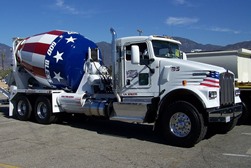How to Decide on the Best Truck Driving School near Ontario California
 Congrats on your decision to become a truck driver and enroll in a CDL school near Ontario CA. Perhaps it has always been your goal to hit the open highway while operating a big ole tractor trailer. Or possibly you have done some analysis and have found that a career as a truck driver provides excellent pay and flexible work opportunities. No matter what your reason is, it's important to get the appropriate training by picking the right CDL school in your area. When reviewing your options, there are various variables that you'll want to consider before making your final choice. Location will no doubt be important, particularly if you need to commute from your Ontario residence. The expense will also be important, but selecting a school based solely on price is not the ideal method to make certain you'll obtain the right education. Just remember, your goal is to master the knowledge and skills that will allow you to pass the CDL exams and become a professional truck driver. So keeping that goal in mind, just how do you select a truck driving school? The answer to that question is what we are going to address in the rest of this article. But first, we are going to talk a little bit about which commercial driver's license you will eventually need.
Congrats on your decision to become a truck driver and enroll in a CDL school near Ontario CA. Perhaps it has always been your goal to hit the open highway while operating a big ole tractor trailer. Or possibly you have done some analysis and have found that a career as a truck driver provides excellent pay and flexible work opportunities. No matter what your reason is, it's important to get the appropriate training by picking the right CDL school in your area. When reviewing your options, there are various variables that you'll want to consider before making your final choice. Location will no doubt be important, particularly if you need to commute from your Ontario residence. The expense will also be important, but selecting a school based solely on price is not the ideal method to make certain you'll obtain the right education. Just remember, your goal is to master the knowledge and skills that will allow you to pass the CDL exams and become a professional truck driver. So keeping that goal in mind, just how do you select a truck driving school? The answer to that question is what we are going to address in the rest of this article. But first, we are going to talk a little bit about which commercial driver's license you will eventually need.
Which Commercial Drivers License Is Required?

To drive commercial vehicles legally within the United States and Ontario CA, a driver needs to get a CDL (Commercial Driver's License). The 3 classes of licenses that a person can qualify for are Class A, Class B and Class C. Given that the topic of this article is how to select a truck driver school, we will discuss Class A and B licenses. What differentiates each class of CDL is the kind of vehicle that the driver can operate in addition to the GVWR (Gross Vehicle Weight Rating) or GCWR (Gross Combination Weight Rating). Below are brief descriptions for the two classes.
Class A CDL. A Class A CDL is required to drive any vehicle that has a GCWR of more than 26,000 lbs., including a towed vehicle of greater than 10,000 lbs. A few of the vehicles that drivers may be able to operate with Class A licenses are:
- Interstate or Intrastate Tractor Trailers
- Trucks with Double or Triple Trailers
- Tanker Trucks
- Livestock Carriers
- Class B and Class C Vehicles
Class B CDL. A Class B CDL is required to drive single vehicles having a GVWR of more than 26,000 lbs., or a GCWR of more than 26,000 lbs. including a towed vehicle weighing up to 10,000 lbs. A few of the vehicles that drivers may be qualified to operate with Class B licenses are:
- Tractor Trailers
- Dump Trucks
- Cement Mixers
- Large Buses
- Class C Vehicles
Both Class A and Class B CDLs may also need endorsements to operate specific kinds of vehicles, for example school or passenger buses. And a Class A licensee, with the proper required endorsements, can operate any vehicle that a Class B license holder is authorized to operate.
How to Assess a Truck Driving School

When you have decided which Commercial Drivers License you wish to obtain, you can start the undertaking of assessing the Ontario CA truck driver schools that you are looking at. As previously mentioned, location and cost will no doubt be your primary considerations. But it can't be stressed enough that they should not be your only considerations. Other factors, for instance the experience of the instructors or the reputations of the schools are equally or even more important. So below are some additional things that you need to research while conducting your due diligence prior to selecting, and especially paying for, your truck driving training.
Are the Schools Accredited or Certified ? Not many trucking schools in the Ontario CA area are accredited because of the demanding process and cost to the schools. However, certification is more common and is offered by the Professional Truck Driver Institute (PTDI). A school is not required to become certified, but there are certain advantages. Interested students recognize that the training will be of the highest caliber, and that they will receive plenty of driving time. For example, PTDI mandates 44 hours of actual driving time, not ride-alongs or simulations. So if a school's course is certified (the course, not the school is certified), students know that the curriculum and training will fulfill the very high standards set by PTDI.
How Long in Business? One clue to help determine the quality of a truck driver school is how long it has been in business. A negatively ranked or a fly by night school normally will not be in business very long, so longevity is a plus. On the other hand, even the top Ontario CA schools had to start from their opening day of training, so consider it as one of multiple qualifiers. You can also ask what the school's track record is concerning successful licensing and employment of its graduates. If a school won't share those numbers, look elsewhere. The schools should also have associations with local and national trucking companies. Having a large number of contacts not only confirms a quality reputation within the profession, but also bolsters their job assistance program for students. It also wouldn't be a bad idea to get in touch with the California licensing authority to make sure that the CDL trucking schools you are considering are in compliance.
How Good is the Training? At a minimum, the schools must be licensed in California and hire instructors that are trained and experienced. We will discuss more about the instructors in the next section. In addition, the student to instructor ratio should not be higher than 4 to 1. If it's any higher, then students will not be obtaining the personal instruction they will need. This is particularly true regarding the one-on-one instruction for behind the wheel training. And be critical of any school that claims it can teach you to drive trucks in a comparatively short period of time. Learning to be an operator and to drive a tractor trailer professionally takes time. The majority of Ontario CA schools offer training courses that run from three weeks to as long as two months, based on the class of license or type of vehicle.
How Good are the Instructors? As earlier mentioned, it's imperative that the instructors are qualified to teach driving methods and experienced as both instructors and drivers. Even though several states have minimum driving time requirements to qualify as a teacher, the more professional driving experience a teacher has the better. It's also vital that the teachers stay current with industry developments or any new laws or changes in regulations. Assessing teachers might be a bit more subjective than other criteria, and possibly the best approach is to check out the school and speak with the teachers face to face. You can also talk to a few of the students going through the training and ask if they are satisfied with the level of instruction and the teacher's ability to train them.
How Much Driving Time? Above all else, a great trucking school will furnish plenty of driving time to its students. Besides, isn't that what it's all about? Driving time is the real time spent behind the wheel driving a truck. Although the use of simulators and ride-a-longs with other students are necessary training methods, they are no substitute for real driving. The more instruction that a student gets behind the wheel, the better driver she or he will be. And even though driving time can vary between schools, a reasonable benchmark is a minimum of 32 hours. If the school is PTDI certified, it will provide no less than 44 hours of driving time. Check with the Ontario CA schools you are researching and find out how much driving time they provide.
Are they Captive or Independent ? It's possible to receive free or discounted training from some truck driving schools if you enter into an agreement to drive for a specific carrier for a defined amount of time. This is what's known as contract training, and the schools that provide it are called captives. So instead of having affiliations with numerous trucking lines that they can refer their students to, captives only refer to one company. The tradeoff is receiving less expensive or even free training by surrendering the flexibility to initially work wherever you choose. Obviously contract training has the potential to reduce your income opportunities when starting out. But for many it may be the only way to get affordable training. Just be sure to ask if the Ontario CA schools you are considering are captive or independent so that you can make an informed decision.
Is there CDL Testing Onsite? There are several states that will allow third party CDL testing onsite of truck driver schools for its grads. If onsite testing is permitted in California, ask if the schools you are looking at are DMV certified to provide it. One benefit is that it is more convenient than battling with graduates from other schools for test times at California testing centers. It is moreover an indication that the DMV regards the authorized schools to be of a higher quality.
Are the Class Times Convenient? As previously noted, CDL training is just one to two months in length. With such a brief term, it's essential that the Ontario CA school you enroll in provides flexibility for both the curriculum and the scheduling of classes. As an example, if you're having a hard time learning a particular driving maneuver, then the teacher should be willing to dedicate more time with you until you are proficient. And if you're still employed while going to training, then the class scheduling needs to be flexible enough to accommodate working hours or other obligations.
Is Job Placement Provided? Once you have acquired your CDL license after graduating from truck driver school, you will be eager to begin your new profession. Confirm that the schools you are considering have job assistance programs. Find out what their job placement rate is and what average salary their grads start at. Also, find out which national and local trucking companies their graduates are referred to for employment. If a school has a low job placement rate or few Ontario CA employers hiring their graduates, it might be a clue to look elsewhere.
Is Financial Assistance Available? Truck driver schools are similar to colleges and other Ontario CA area vocational or trade schools when it comes to loans and other forms of financial aid being available. Find out if the schools you are assessing have a financial aid department, or at least someone who can help you navigate the options and forms that need to be submitted.
Learn More About Ontario CDL Driving Schools
Select the Right Ontario CA CDL Driver Training
Picking the right truck driving school is an essential first step to launching your new profession as a local or long distance truck driver. The skills that you will learn at school will be those that mold a new career behind the wheel. There are many options offered and understanding them is crucial to a new driver's success. But first and foremost, you must obtain the proper training in order to operate a large commercial vehicle in a professional and safe fashion. If you are lacking money or financing, you might need to look into a captive school. You will pay a reduced or in some cases no tuition in exchange for driving for their contracted carrier. Or you can enroll in an independent trucking school and have the the freedom to drive for the trucking company of your choosing, or one of several affiliated with the school. It's your decision. But regardless of how you obtain your training, you will soon be entering an industry that helps our country move as a professional trucker in Ontario CA.
